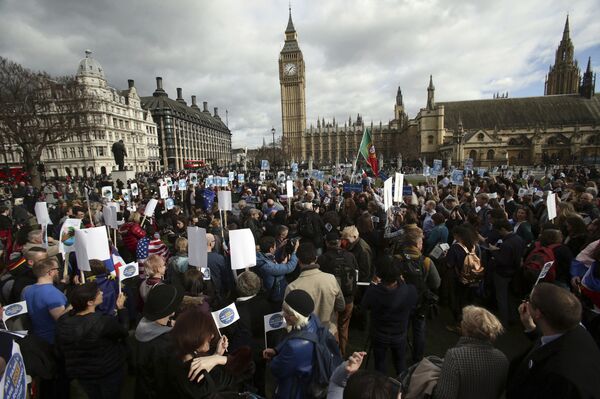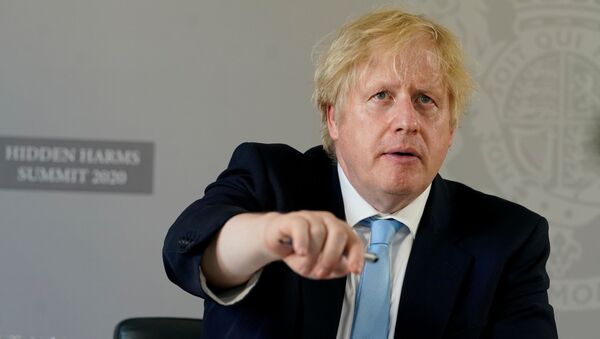UK Prime Minister Boris Johnson has hinted that he may look into possible ways families without recourse to public funds due to their immigration status could be helped by the Government amid the current COVID-19 pandemic, reports the Independent.
Over 100,000 families living legally in the UK are currently believed to be subject to a “no recourse to public funds” requirement, which grants them the right to reside in the UK but denies them access to most benefits.

The status, frequently slammed by critics for generating poverty, has rendered the life of these people even more difficult during the COVID-19 pandemic, by excluding them from public assistance.
On 27 May Boris Johnson appeared ignorant of the status, when questioned by MPs at a hearing of the Commons Liaison Committee.
When Labour MP Stephen Timms said that many families were “being forced by the current arrangements into destitution” due to the “no recourse to public funds” rule, Johnson was cited as having displayed confusing, asking:
“Why aren’t they eligible for Universal Credit, or ESA or any of the other benefits?”
The MP took a moment to explain that “no recourse to public funds” was “a condition that’s attached to their leave of remain”.
“They’ve been here for years, their children have been born in the UK but, because for a ten year period, we have this No Recourse to Public Funds, at the moment they can get no help at all,” said the MP.
In response, Johnson said:
“I’m going to have to come back to you on that Stephen because clearly people who have worked hard for this country and who live and work here should have support of one kind or another… You’ve raised a very important point – if the condition of their leave to remain is that they should have no recourse to public funds I will find out how many there are in that position and we will see what we can do to help.”
Commenting later, Labour MP Jess Phillips spoke of Boris Johnson’s apparent oblivion of the issue as “quite phenomenal”, while Labour’s Angela Eagle said that it was “unbelievable but true”.
Johnson’s response to “look into” the matter was applauded by the Joint Council for the Welfare of Migrants.

The JCWI’s public affairs and campaigns manager Minnie Rehman was cited by PoliticsHome as saying:
“The Prime Minister is right to be shocked that migrants, and their families, have been left to fend for themselves during this pandemic… We will be holding Boris Johnson to the commitment he has made to help those who have been placed in this situation by Government policy.”
The SNP migration spokesman Stuart McDonald added that the prime Minister “has the perfect opportunity to fix things with the Immigration Bill comes back to Parliament in a couple of weeks, and we’ll be very happy to help him”.
Meanwhile, the UK Home Office was cited as conforming that the No Recourse to Public Funds (NRPF) rule has been “long established as being in the public interest”.
“Those seeking to establish their family life in the UK must do so on a basis that prevents burdens on the State and the UK taxpayer. It is right that those who benefit from the State contribute towards it. No recourse to public funds (NRPF) is a standard condition applied to those staying here with a temporary immigration status to protect public funds. Indefinite Leave to Remain (ILR) is set as the general threshold for permitting migrants to access public funds. Migrants who are here without leave are also subject to no recourse to public funds. Therefore, most migrants do not have access to public funds as a matter of course.”
Earlier, Boris Johnson was urged to scrap rules preventing thousands of migrants living in the UK from accessing benefits that could ease their plight, rendered even more difficult by the coronavirus pandemic.
The Liberal Democrats and Labour MPs, as well as London mayor Sadiq Khan urged the ‘No Recourse to Public Funds’ immigration status be put on pause after warnings that workers were being shut out of accessing Universal Credit and placed at risk of breaching social distancing rules.
“We urge you to lift that rule for the duration of the crisis, so migrants – like everyone else – are given the financial support they need to stay at home,” said the letter to the Prime Minister and Home Secretary Priti Patel by Lib Dem MP Christine Jardine, cited by PoliticsHome.
In 1999 the NRPF status was first introduced to curb access to state aid for people who are subject to immigration controls.
Migrants receiving the status by the Home Office are not eligible for most state benefits, including Universal Credit, housing benefit, aid towards council tax payments, and access to means-tested free school meals for their children, even if granted leave to remain in the UK.

The status does not curb access to NHS treatment or state schools.
While there are no specific figures published by the Home Office on the number of people affected by the rules, in 2016 a study carried out by the Children’s Society estimated that some 50,000 households with dependents had a member impacted by the status.


